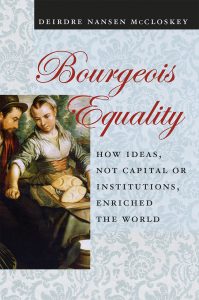Deirdre N. McCloskey on “How the West Got Rich”

In a recent piece for the Wall Street Journal, Deirdre N. McCloskey underlines some of the major themes that inform her decade-in-the-making trilogy The Bourgeois Era, including those particular to its most recent volume, Bourgeois Equality: How Ideas, Not Capital or Institutions, Enriched the World. Denying the centrality of accumulated capital, and turning instead to the accumulation of ideas, McCloskey posits “betterment” at the core of, well, how we became bourgeois. More about this in her book, but here’s a teaser from the WSJ:
What caused it? The usual explanations follow ideology. On the left, from Marx onward, the key is said to be exploitation. Capitalists after 1800 seized surplus value from their workers and invested it in dark, satanic mills. On the right, from the blessed Adam Smithonward, the trick was thought to be savings. The wild Highlanders could become as rich as the Dutch—“the highest degree of opulence,” as Smith put it in 1776—if they would merely save enough to accumulate capital (and stop stealing cattle from one another).
A recent extension of Smith’s claim, put forward by the late economics Nobelist Douglass North (and now embraced as orthodoxy by the World Bank) is that the real elixir is institutions. On this view, if you give a nation’s lawyers fine robes and white wigs, you will get something like English common law. Legislation will follow, corruption will vanish, and the nation will be carried by the accumulation of capital to the highest degree of opulence.
But none of the explanations gets it quite right.
What enriched the modern world wasn’t capital stolen from workers or capital virtuously saved, nor was it institutions for routinely accumulating it. Capital and the rule of law were necessary, of course, but so was a labor force and liquid water and the arrow of time.
The capital became productive because of ideas for betterment—ideas enacted by a country carpenter or a boy telegrapher or a teenage Seattle computer whiz. As Matt Ridley put it in his book “The Rational Optimist” (2010), what happened over the past two centuries is that “ideas started having sex.” The idea of a railroad was a coupling of high-pressure steam engines with cars running on coal-mining rails. The idea for a lawn mower coupled a miniature gasoline engine with a miniature mechanical reaper. And so on, through every imaginable sort of invention. The coupling of ideas in the heads of the common people yielded an explosion of betterments.
To read more about Bourgeois Ethics, or McCloskey’s other books in the series The Bourgeois Virtues, click here.